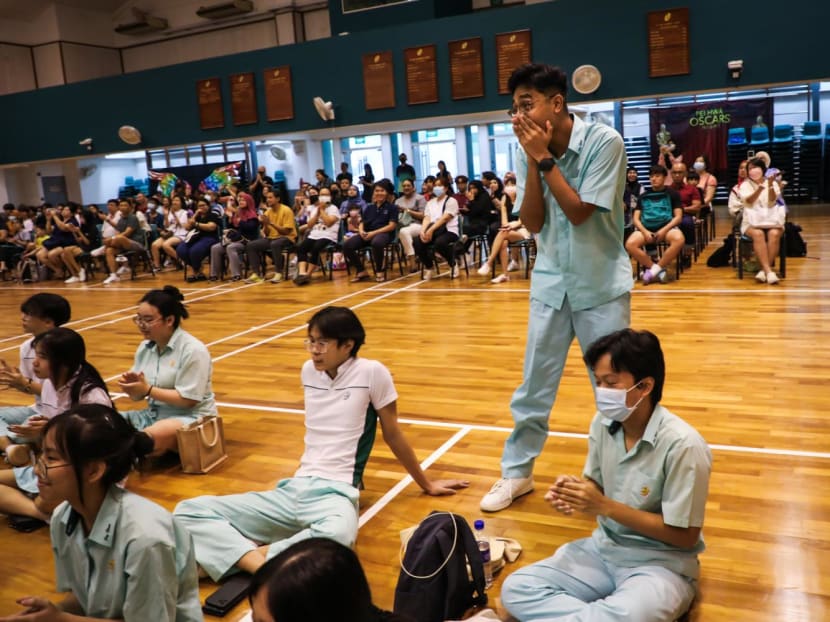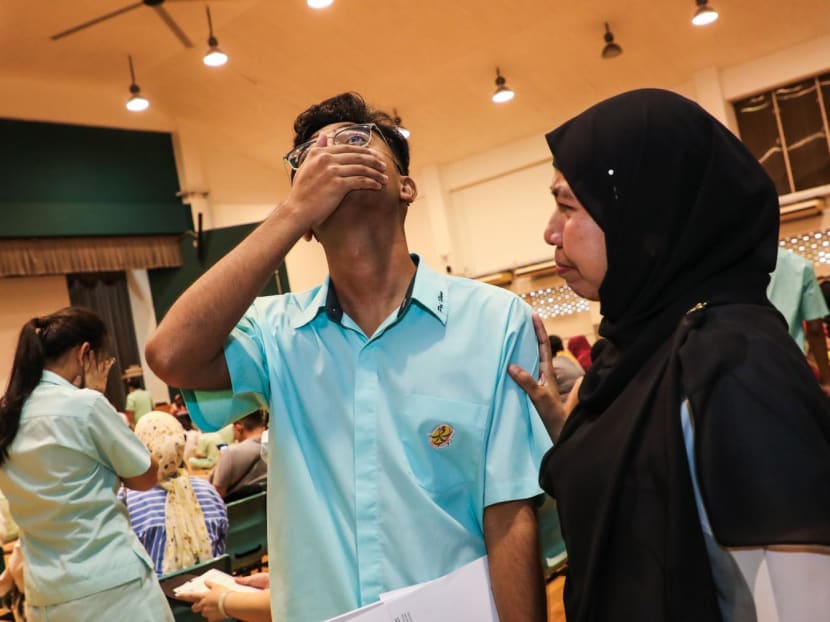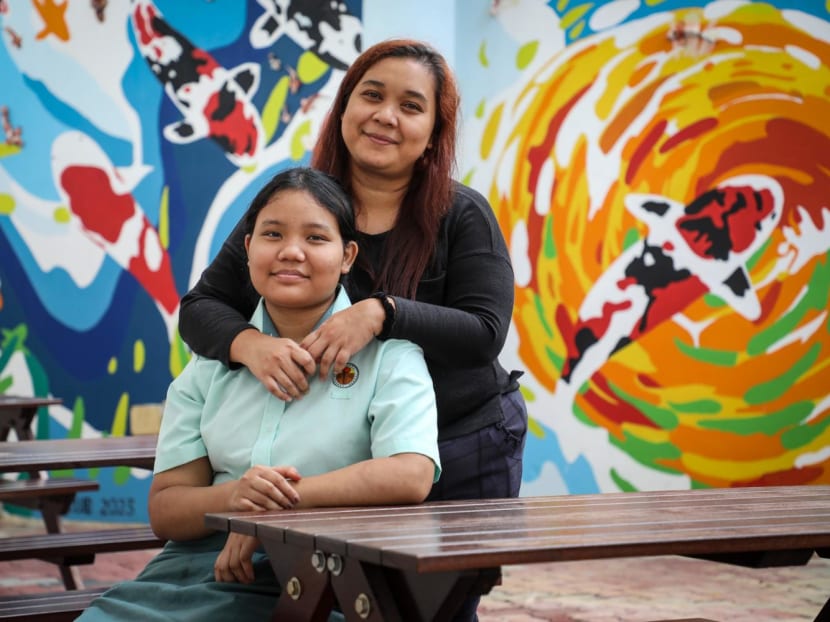Retained in Sec 1 due to absenteeism, student becomes peer support leader who excels in N-Levels
SINGAPORE — Unable to cope with a personal setback, Pei Hwa Secondary School student Harivaran Paul Kumar took to skipping school practically every day after the first school term in Secondary 1, turning up only one to two days each term for post-examination activities.

Harivaran Paul Kumar, from Pei Hwa Secondary School, reacts as he received news of his N-Level results on Dec 18, 2023.
- Unable to cope with a personal setback, Harivaran Paul Kumar began to skip school from the second term of Secondary 1
- The Pei Hwa Secondary School student was later retained, which became a turning point for him
- With support from his teachers, Harivaran eventually excelled in his N-Level examination
- Over at Punggol Secondary School, Cinta Nur Fitriyana Rizzuan did well for her exams while juggling work and helping to care for her siblings
SINGAPORE — Unable to cope with a personal setback, Pei Hwa Secondary School student Harivaran Paul Kumar took to skipping school practically every day after the first school term in Secondary 1, turning up only one to two days each term for post-examination activities.
“My friends would text me almost every day, begging me to come to school because they missed me,” the 17-year-old told TODAY on Monday (Dec 18) in school.
His teachers, too, would go to his home frequently to speak to him and encourage him to go to school.
Due to him missing most of school in 2019, Harivaran had to repeat Secondary 1 the following year.
While he had already prepared himself to "face the music”, he said that a combination of seeing his mother cry over him and watching his schoolmates from his cohort move up a level without him became a “turning point” that pushed him to eventually return to school consistently.
He also credited his recovery to “a lot of encouragement” shown by his teachers, including his form teacher who nominated him to take on a peer leadership role and was proactive in reaching out to him when he missed school again sometime in 2020.
Despite his rocky start, Harivaran on Monday turned out to be one of the top performing students from the Normal Technical cohort in his school — scoring one A and three Bs for the four subjects he took at the Normal Technical level and Grade 4 each for English and Malay Language which he took at the Normal Academic level, giving him a good EMB1 aggregate of five.
EMB1 is an aggregate score comprising English, Maths and one best subject. The lowest — and best — achievable score is three.
FROM TROUBLED ABSENTEE TO PEER SUPPORT LEADER
While he declined to share the nature of the setback he had faced, the extent of the struggle he went through was evident when TODAY spoke to him, his mother and his teacher.
His mother, Madam Zakia Maidu, 52, said that there were days when her son already showered and put on the school uniform, but could not bring himself to head to school.
“For example, his year head, Mr Bernard Kang, will either come or call every day,” the homemaker said, adding that the school was very consistent in showing support for her son.
With the support, Harivaran did not just turn himself around academically but left an impact on his schoolmates as a peer support leader — a student role that includes looking out for fellow students and speaking to them if they have problems.
Mr Kang told TODAY: “Ms Lee Sixian (Harivaran's form teacher) saw Hari as someone who had a very strong sense of empathy and someone who probably had good communication skills.”
He added that Harivaran’s personal experience also puts him in a very good position to support his peers.
Harivaran said that the role was something he initially found challenging. He described himself as introverted and not one who would typically initiate a conversation.
“I suffered a lot alone, I didn’t want to talk about (my problems) and kept them to myself. And I realised it’s a bad thing for me.”
He added that he did not want to see his peers “suffer the same thing” as he did, and this motivated him to overcome whatever apprehension he may have and reach out to others to try to get them to open up.
He recalled an instance when he spotted a classmate whom he was “not really close to”, looking beside himself during a physical education (PE) lesson.
“I approached him to ask what’s wrong, and he randomly opened up to me during PE lesson and told me he was facing some problems,” he said.
Harivaran then gave him some words of comfort and flagged the case to their form teacher.
Ms Lee also played a key role in ensuring that Harivaran kept on track to recover academically. Harivaran recalled one incident when he relapsed and skipped school for a day in 2020.
“She quickly took action, called me, talked to me and said, ‘Don’t go back down that road again’,” he recounted.
“That was when I thought to myself that I really need to just persevere and focus on studying.”
Her nominating him to become a peer support leader also nudged him to step out of his comfort zone and helped him to develop as an individual, he added.

Reflecting on the slightly longer path he took in secondary school, Harivaran said that the main lesson he learnt was about resilience.
“People didn’t even realise how hard it was for me to even get myself out of bed to take a step to even go to school in my second year,” he said, adding that it was resilience that eventually took him to where he is today.
The pupil was among some 13,500 students who sat for their GCE N-Level examinations this year and collected their results on Monday.
About 77.2 per cent of the 9,153 candidates who sat the Normal Academic-Level exams this year can progress to Secondary 5.
A total of 9,094 or 99.4 per cent of the cohort were awarded their GCE Normal Academic-Level certificates — indicating that they scored at least a Grade 5 or better in at least one subject.
Another 4,422 Normal Technical candidates sat for the exams, with 97.9 per cent or 4,330 of them obtaining at least a Grade D or better in at least one subject and being awarded the Normal Technical-Level certificate.
One student who received her results was Punggol Secondary School student Cinta Nur Fitriyana Rizzuan.
After her parents went through a divorce, Cinta had to juggle school, household chores and working part-time at a fast-food restaurant — which she started in Secondary 2.
“My mum was struggling a lot financially. And she also was not in a good mental state after the divorce, so I felt bad for her and I felt the need to help,” the 16-year-old said.
Her mother, Ms Siti Farhanah Bakeri, works 12-hour shifts at a catering company.
She said that Cinta would help to cook or buy dinner for the younger siblings — aged 13 and nine — and supervise them until their mother returns from work.
When Cinta first broached the idea with her mother of working part-time, Ms Siti Farhanah said that she was concerned about her daughter’s well-being.
“She has social anxiety. What if she breaks down at work and all that?” the mother recalled.
It helped, though, that Cinta’s grandmother was also working at the same restaurant, so there was someone familiar looking out for the teenager at work, Ms Siti Farhanah added.
Cinta admitted that she found it challenging to socialise with her co-workers and to manage her time, especially for the first few months at work, to the extent that she saw her grades dip — though she did not say how far they dropped.
“When I started working, my time management was really bad. To the point that I forget to do some homework,” she said.
Cinta works 16 hours every weekend during school term, and on weekdays during the school holidays.

The girl said that some teachers were aware of her situation of juggling work and school, but she “decided not to make it as an excuse for myself”.
On top of working and studying, Cinta was also the person that her younger siblings and even their mother sometimes turn to for a listening ear.
“We (the siblings) share the same room. So sometimes when they have problems, they just turn and tap my shoulder and go, ‘Kakak, I have some problems I have to tell you about’,” she said, using the Malay term for sister.
“It’s tiring, but I have a soft spot for them because, after all, they are my siblings.”
Cinta scored 16 points for the six subjects she took for her Normal Academic-Level examinations, giving her the option of continuing her education to Secondary 5 or pursue an Architectural Technology course at the Institute of Technical Education via the Early Admission Exercise.
Although undecided on what option she would take, Cinta said that she wants to study hard so that she can qualify to enter polytechnic.
On what advice she would give to her younger self if given a chance, she had this to say: "Definitely better time management. If I managed my time better earlier, I think my grades would have been higher."
Asked about the favourite part of her education journey, the teenager who bought only markers for herself while treating her mother and siblings to a meal with her first pay, said: "Getting closer to my mum. Actually before this, we were not that close."











